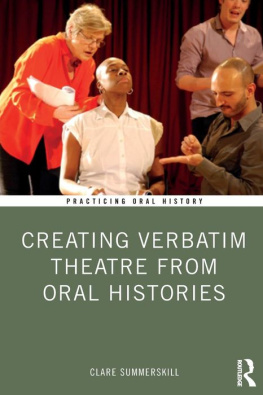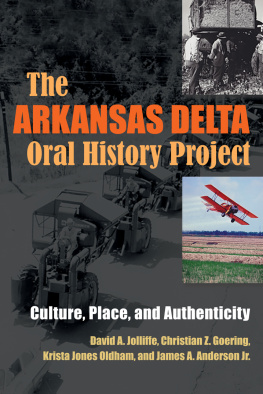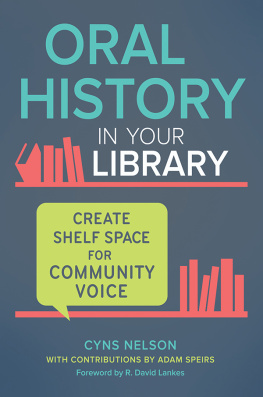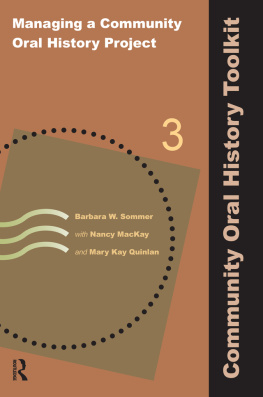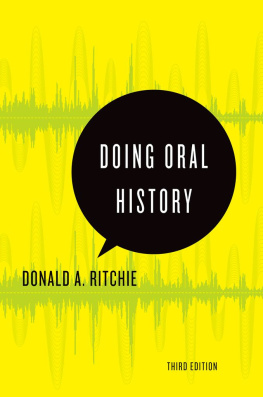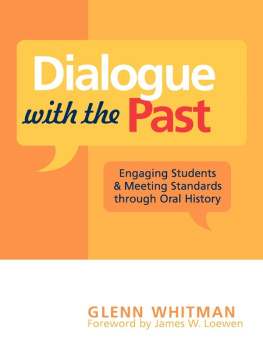Practicing Oral History to Improve Public Policies and Programs
The use of contemporary oral history to improve public policies and programs is a growing, transdisciplinary practice. Indispensable for students and practitioners, Practicing Oral History to Improve Public Policies and Programs is the first book to define the practice, explain how policy-makers use it, show how it relates to other types of oral history, and provide guidance on the ethics and legalities involved.
Packed with case studies from disciplines as diverse as medicine, agriculture, and race relations, as well as many examples from the authors own work, this book provides an essential overview of the current state of the field within oral history for public policy and a complete methodology for the process of designing and implementing an oral history project. The comprehensive How To section demonstrates how to use the practice to advance the readers career, their chosen discipline and the public interest, whether their field is in oral history or in public policy.
This book is an important resource for oral historians, fledgling or experienced, who are keen to find new applications and funding for their work, as well as for professionals in the public and not-for-profit sectors who want to learn to use oral history to improve their own policies and programs.
Marella Hoffman is a Fellow of the Royal Anthropological Institute, and has lectured or held research awards at universities in France, Switzerland, Ireland, the US, and at Cambridge University. She was for a decade chief editor of a public policy magazine for government in Cambridge. Her other books are Asylum under Dreaming Spires: Refugees Lives in Cambridge Today (2017); Savoir-Faire of the Elders in the French Mediterranean Hills (in French, 2016); and Magnets (2007). Her work also appears in international collaborations Human Rights and Good Governance: Building Bridges (2000); Location and Dislocation in Contemporary Irish Society: Emigration and Irish Identities (1997); and Cross-currents in European Literature (1993). Visitwww.marellahoffman.com
Practicing Oral History
Series editor, Nancy MacKay
Museums, historical societies, libraries, classrooms, cultural centers, refugee organizations, elder care centers, and neighborhood groups are among the organizations that use oral history both to document their own communities and to foster social change. The Practicing Oral History series addresses the needs of these professionals with concise, instructive books about applying oral history best practices within the context of their professional goals.
Titles fall into one of three areas of applied oral history. The first format addresses a specific stage or skill within the oral history process. The second addresses the needs of professional communities who use oral history in their field. The third approach addresses the way oral history can be used to make an impact. Each title provides practical tools, ethical guidelines and best practices for conducting, preserving, and using oral histories within the framework of acknowledged standards and best practices.
Readers across a wide array of disciplines will find the books useful, including education, public history, local history, family history, communication and media, cultural studies, gerontology, documentary studies, museum & heritage studies, and migration studies.
Series titles:
Practicing Oral History in Historical Organizations
Barbara W. Sommer
Practicing Oral History with Immigrant Narrators
Carol McKirdy
Story Bridges
A Guide for Conducting Intergenerational Oral History Programs
Angela Zusman
Practicing Oral History to Improve Public Policies and Programs
Marella Hoffman
Practicing Critical Oral History
Connecting School and Community
Christine K. Lemley
For more information, or to place orders visit Routledge, Practicing Oral History,www.routledge.com/Practicing-Oral-History/book-series/POHLCP
First published 2018
by Routledge
711 Third Avenue, New York, NY 10017
and by Routledge
2 Park Square, Milton Park, Abingdon, Oxon OX14 4RN
Routledge is an imprint of the Taylor & Francis Group, an informa business
2018 Taylor & Francis
The right of Marella Hoffman to be identified as author of this work has been asserted by her in accordance with sections 77 and 78 of the Copyright, Designs and Patents Act 1988.
All rights reserved. No part of this book may be reprinted or reproduced or utilised in any form or by any electronic, mechanical, or other means, now known or hereafter invented, including photocopying and recording, or in any information storage or retrieval system, without permission in writing from the publishers.
Trademark notice : Product or corporate names may be trademarks or registered trademarks, and are used only for identification and explanation without intent to infringe.
Library of Congress Cataloging-in-Publication Data
Names: Hoffman, Marella, author.
Title: Practicing oral history to improve public policies and programs /
Marella Hoffman.
Description: New York, NY : Routledge, an imprint of the Taylor &
Francis Group, 2017. | Series: Practicing oral history | Includes
bibliographical references and index.
Identifiers: LCCN 2017028348 | ISBN 9781629584850 (hardback :
alk. paper) | ISBN 9781629584867 (pbk. : alk. paper) | ISBN
9781315107462 (ebook)
Subjects: LCSH: Oral historyCase studies. | Policy sciences
MethodologyCase studies.
Classification: LCC D16.14 .H64 2017 | DDC 320.6dc23
LC record available athttps://lccn.loc.gov/2017028348
ISBN: 978-1-62958-485-0 (hbk)
ISBN: 978-1-62958-486-7 (pbk)
ISBN: 978-1-315-10746-2 (ebk)
Typeset in Bembo
by Apex CoVantage, LLC
I am delighted to present Practicing Oral History to Improve Public Policies and Programs as the first book under the Routledge imprint, our new home for the Practicing Oral History series. It seems especially fitting that this book be the first Routledge title, since author Marella Hoffman is based in the Cambridge, England, area, right down the road from the Routledge editorial office, while I am 5,000 miles away in California.
Marella and I began talking about this project two years ago, in spring of 2015, mere moments in time for a historian. Yet, this particular two-year interval feels like a quantum leap from one epoch to another. We were both stunned by unexpected election results in our respective homelands, and the freefall that continues to unfold as I write. The Brexit vote in the United Kingdom and the election of Donald Trump in the United States give pause to members of the liberal-minded worlds we both live in. Who are these voters that came forth as a majority to vote for the United Kingdom to leave the European Union? Who are the voters that elected a TV personality with no experience in government to the position oft considered the most powerful in the world, the President of the United States? Where are these voters, our fellow citizens, and why dont we talk to each other? How did the gap in understanding grow so deep? How can we recover the middle ground?


